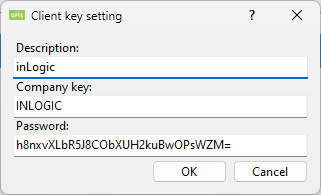Parking
The Parking function makes it easy to avoid parking tickets at schools, which administer their parking spaces with the parking company. Through the app, students and employees can get a valid, digital parking permit simply by entering their vehicle’s registration number in the app or in UMS Web. When the registration number has been entered, it becomes visible to the parking company, who then knows that the user is allowed to park at the school. Available integration includes Parkzone, Apcoa and City Parkering.
Prerequisites
Supported administrative systems
- Parkzone
- Apcoa
- City Parkering
Module requirements
Parking
Should third party be contacted
You'll need a client key (and possibly a password) from the parking company before UMS can communicate with their services.
Installation
It is necessary to have a running UMS installation.
Configuration settings
There are two ways of settings up parking: New Parking and Legacy Parking. In the future legacy will be moved to the new system. Currently new Parking settings are used for City Parkering and legacy parking settings are used for ParkZone and Apcoa.
New Parking Settings
In the configurator go to:
Modules -> Parking
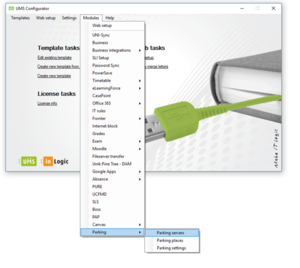
There are 3 main parts of the parking system that needs to be set up:
Parking servers
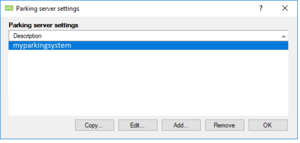
It is possible to set up multiple parking server systems.
You can add, edit or remove a system.
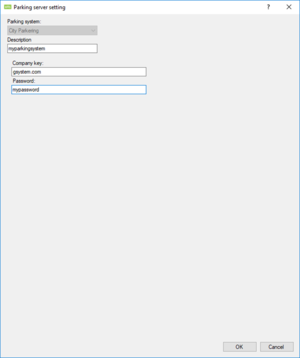
First you choose your parking system (currently only City Parkering is available, but more will be added in future releases).
The description is used as a name or reference in the configurator, but is not visible to users.
You should have been provided a company key and a password by your parking provider, enter them in these parking server settings.
Parking places
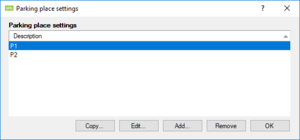
You can have multiple parking places, and you can edit, add or delete them.
This parking place description is shown to the user if they have access to multiple parking systems to choose from, so make sure that this is a good identifier.
When "Delete users" is enabled, users that are removed in UMS will also be deleted from the parking system.
When "Cleanup" is enabled, users that exists in the parking system but not UMS will also be deleted.
Mail Domain is used only when a parking is created for a user that does not have a private email address entered. If there is a private email address it will be used, otherwise the username concatenated with the Mail Domain will be send.
Parking settings
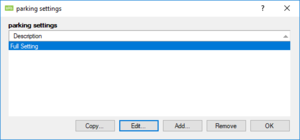
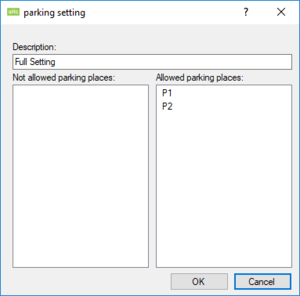
You can set up a parking setting per template, so that one set of users have access to some parking places but not others.
If you only have one parking place, and everyone has access to it, you can just create one parking setting.
You can connect a parking setting to a template:
- Go to edit your template.
- Find the parking menu, and select the parking setting you want for you template.
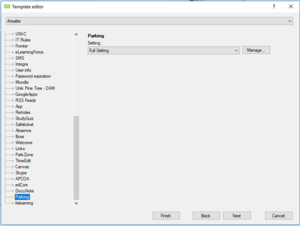
A parking setting is connected to a template.
Legacy Parking Settings
1. ParkZone setup
All settings for the Parking module is set in the configurator. Go to Template Editor -> Parkzone -> Manage -> Add
- 'Description' - This is the name for your setting, i.e. 'Test Plads'
- 'Client Key settings' - Insert the provided client key from ParkZone. To edit the settings for the client key, click 'Manage'. See picture below for illustration.
- 'Permission group' - Insert the provided parking location ID from ParkZone
- 'Delete users' - Check this box if a user should be disabled when removed from AD. If left unchecked, the user will only be disabled if the end date is set to now
- 'Cleanup' - Check this box if UMS should synchronise if users are active or deleted
- 'Maximum number of license plates' - Set the limit of license plates a user may add
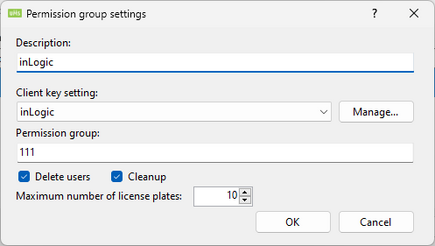
The picture below illustrates the settings when managing the client key.
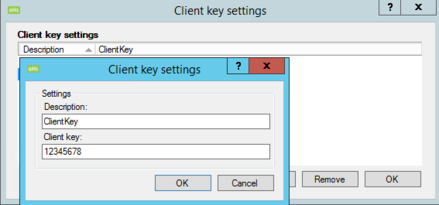
2. APCOA setup
All settings for the Parking module is set in the configurator. Go to Template Editor -> APCOA -> Manage -> Add
- 'Description' - This is the name for your setting, i.e. 'Setup'
- 'Client key settings' - Insert the provided client key from APCOA. To edit the settings for the client key, click 'Manage'. See picture below for illustration.
- 'Permission group ID' - Insert the provided parking location ID from APCOA
- 'Delete users' - Check this box if a user should be disabled when removed from AD. If left unchecked, the user will only be disabled if the end date is set to now
- 'Cleanup' - Check this box if UMS should synchronise if users are active or deleted
- 'Maximum number of license plates' - Set the limit of license plates a user may add
- 'Mail Domain' - User suffix
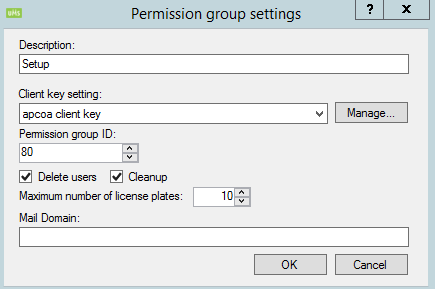
The picture below illustrates the settings when managing the client key.
